Ancient Rome, Modern America, and the Erosion of Norms
As long as I can remember, and longer than that to be sure, people have been making proclamations about the cause of Rome’s decline and destruction, and drawing alleged parallels with the United States. Most of the time there is little in the way of facts or well-reasoned arguments to these claims. People are just using Rome as a jumping off point to complain about something they don’t like and hoping the alleged connection between Rome and America will make them sound wise. One refrain I’ve heard many times is the claim that “The acceptance of homosexuality is what brought down the Romans.” There’s no evidence for this. The Romans had some acceptance of people engaging in same sex acts, but this was not a legal acceptance of same sex couples, building a life and family together. More importantly, there is no connection between anyone’s sex life and the overall political status of Rome. Such observations about Rome and America are just an excuse for homophobes to express their homophobia; cloaking it beneath an air of historical respectability. This does give me pause about making connections between ancient Roman and present-day America. However, after the Supreme Court’s decision elevating the presidency to king-like status or a dictator-lite status, with the potential to go full dictator, it is more than valid to look back at the history of Rome and point out some general parallels.
One important point that’s typically lost in these Rome-America comparisons is a definition of which, “end of Rome,” the speaker is talking about. There was no single moment when the entire Roman World suddenly fell apart. There were various retreats from conquered territories and multiple sackings of the city. Western Europeans often refuse to acknowledge it, but the Eastern Roman Empire continued on for more than a thousand years after the last emperor abdicated in the West. But the empire, whole or broken, is not my focus here, and should not be the focus of anyone looking to Rome for a better understanding of the United States today. What matters, is how Rome went from being a republic, to an empire.
Rome began as a small city-state, under a king. When the last Roman King, Tarquin, was overthrown, a republic was established, where some of the people had a meaningful say in their government and competing factions had to make deals and compromises to get things done. This lasted for more than 450 years until the last embers of the republican flame were finally stamped out by the first Emperor Augustus. Some trappings of the republic remained, like the much revered Senate, but from then on, the emperor ruled. His power was not absolute (no ruler’s ever is) but he did have the power to crush anyone who might oppose him and there were no laws that could constrain him or hold him accountable. The emperor was the law.
Many things have changed in the 2,000+ years since the Roman Republic ended, but human nature has not, and we are fools to imagine we are immune from a similar fate.
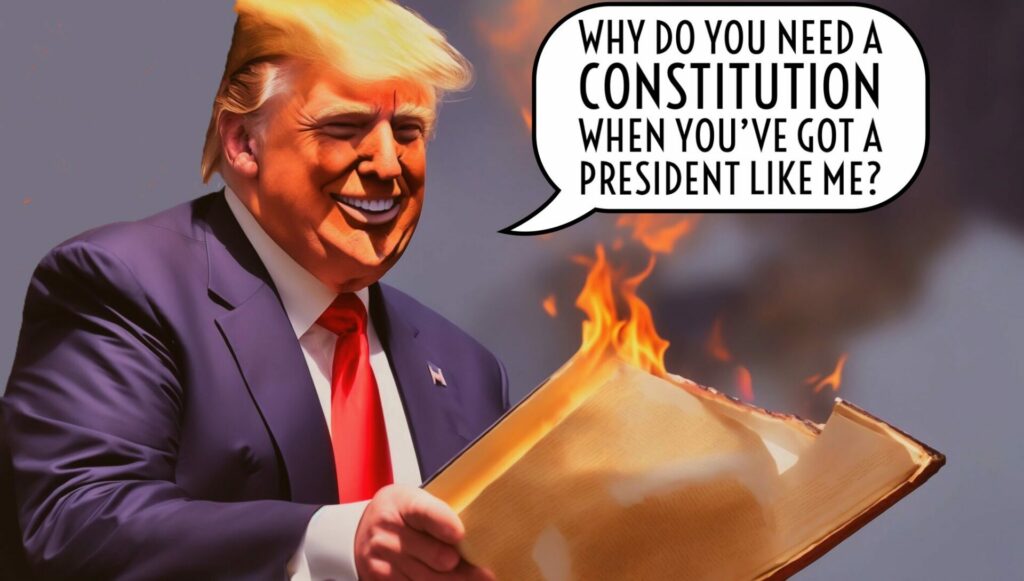
When the majority of the Supreme Court ruled, in Trump v. United States, that presidents have much broader immunity than anyone previously imagined, they were continuing an erosion process that has been underway for a long time. This decision, however, was different from past erosions, because it codified erosion into the law. It was the worst Independence Day present ever and, with hindsight, it may prove to be the turning point that future historians look to and say, “This made the end of the republic nearly inevitable. This was the point at which America crossed the Rubicon. Here, a nation of laws opened the door to a nation of men. Begging for someone to walk through it and seize power; to become the law.”
Writing for the majority, Chief Justice John Roberts insisted that this ruling has not put the president above the law, as surely as any carnival barker insists their games of chance are completely fair, but why should anyone believe him? As Justice Sonia Sotomayor’s dissent explains:
Whether described as presumptive or absolute, under the majority’s rule, a President’s use of any official power for any purpose, even the most corrupt, is immune from prosecution. That is just as bad as it sounds, and it is baseless.”
Obviously, the clear and present danger at the moment is Donald Trump, but even his electoral defeat and imprisonment, for actions not covered under the huge blanket of “official acts” that the Court has thrown over him, will not put an end to the danger. Future leaders, far more strategic than Trump, will certainly try to walk the path now open to them. We would need to enshrine explicit constraints on the presidency through an Amendment to the Constitution to undo what the Supreme Court has done. Something that could only be accomplished through a major shift in public thinking, and that shift in thinking is what really matters. Even a new ruling from the Court, countering the current ruling, cannot put the toothpaste back in the tube.
The end of the Roman Republic
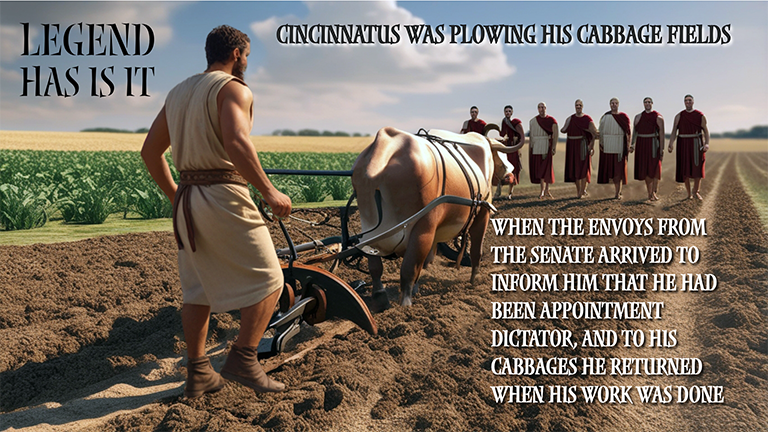
Dictatorship
Normally, the Roman Republic was headed by two, coequal consuls, who were both elected for one year terms at a time. This was designed to insure that no one man would ever have too much power, but it also created confusion and inaction, during times of crisis. The Senate’s solution was to create a new office, a dictator, who could deal with great emergencies. One well-trusted and capable individual was chosen by the Senate and given absolute power, for a limited period of time and a limited purpose. The best known dictator is Lucius Quinctius Cincinnatus, for whom the city of Cincinnati, Ohio is named. He was the ideal model of what a dictator was meant to be.
On two separate occasions, Cincinnatus was called upon to assume dictatorial powers. The first time, he was sent to rescue a Roman army trapped by the Aequi, a neighboring tribe. Cincinnatus swiftly gathered an army, defeated the Aequi, and returned to Rome in triumph. He then resigned as dictator and returned to his farm after serving only 16 days. Cincinnatus’s behavior exemplified the Roman ideal of civic duty and selfless service; of doing for Rome, rather than trying to rule over Rome; of upholding the rule of law and not of men.
The second time Cincinnatus was made dictator, nearly 20 years had passed and he was approaching 80 years old. This time, a plebeian (common person), named Spurius Maelius, was accused by members of the patrician (aristocratic) class, of attempting to stage a coup and make himself king. While the patricians held most of the power in Rome, it was possible for a few commoners to amass wealth and influence, as Maelius had. Few details have survived and we cannot say for certain what, if anything Maelius was plotting. What we can say is that Cincinnatus took charge, investigated the accusations, and found them credible enough that he ordered Maelius’s arrest. When confronted in the Forum, by Cincinnatus’s appointed official, Gaius Servilius Ahala, Maelius apparently resisted arrest and was killed by Ahala. Then, as before, Cincinnatus resigned his dictatorship and returned to his farm.
Marius and Sulla
Many generations passed, with many conflicts and challenges for the Roman Republic to overcome, both external and internal, but the republic held. Then two rivals emerged, Gaius Marius and Lucius Cornelius Sulla, who made significant changes to the law and shook the foundations of the republic until its norms broke.
Gaius Marius, a powerful general and politician from the plebeian class, rose to power in the late Roman Republic through a series of military reforms and political maneuvers. Marius broke traditional norms by allowing landless citizens to enlist in the army, creating a professional standing army loyal to its commander rather than the Senate. This shift in loyalty destabilized the republic, as soldiers became more devoted to their generals than to the state. He also allowed one of his allies, Publius Sulpicius Rufus, to organize violent mobs and intimidate the Senate into going along with Marius’s ideas. The use of violence to undermine the political process of debate and compromise was truly unprecedented in the history of the republic.
Sulla was a patrician, who was also a powerful general and politician at the time. Many of the actions taken my Marius and his allies are debatable in terms of their legality, since Rome lacked a formal constitution, but when Marius’s people resorted to violence, including the unlawful, but temporary detention of Sulla, Sulla resorted to an unprecedented precedent of his own. He marched his troops on Rome, chasing Marius from the city, which clearly violated the law and was unlike the actions of all previous Roman leaders. As part of the effort to restore order, as Sulla saw it, Rufus was executed and his head was put on public display, on the Rostra, a place traditionally used for public speeches.
Years past and Sulla returned to fighting enemies outside of the city; outside the Italian peninsula. This allowed Marius to return to Rome and reestablish his rule again, with the help of Lucius Cornelius Cinna. It is said that the street ran red with blood from the often indiscriminate killing, with bodies left where they died as a warning not to oppose Marius and his supporters.
More years passed before Sulla secured the lands to the east, where he had been at war since leaving Rome. By the time he marched on Rome for a second time, Marius had already died of natural causes, leaving Cinna as the leading figure in the Marius faction. While raising forces and laying plans to stop Sulla, Cinna was killed by his own troops, who were sick of domestic conflict and his leadership. Once Sulla took Rome from those Marian forces who still wanted to fight, he declared himself dictator and intimidated the Senate into formalizing his status under the title of, “dictator legibus scribundis et rei publicae constituendae causa” [dictator for the purpose of writing laws and restoring the republic]. His rule was violent, with many important people executed on his orders, but it was not the indiscriminate violence that was common under Marius and Cinna.
At this point in Roman History, the office of dictator had not been used in more than a century, and no one had ever decided on their own that they had to become a dictator for the preservation of the republic. Sulla did make significant efforts to reform and revamp the laws, believing he would strengthen the system, and he did step aside when he felt his work was done. But his most substantial and long-lasting achievement was the setting of a dangerous example. His success demonstrated that military force could override republican governance and one man could become the law in the name of saving the law.
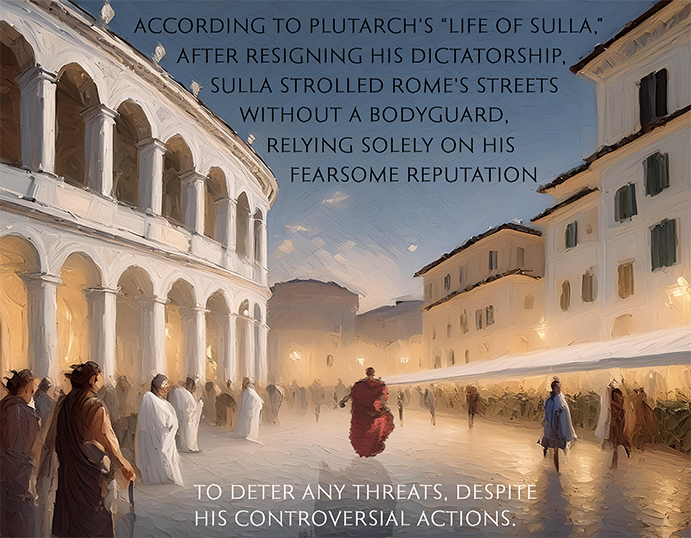
Gaius Julius Caesar and the Rubicon
Legend has it (there are no reliable historical sources on this) that a young Gaius Julius Caesar was one of the people brought before Sulla to be judged in the purge of the Marians. Influential friends of his family argued that while there were ties between Marius and some of Gaius’s relatives, he was just a boy, who had no part in anything. Sulla agreed to let Gaius go, but remarked, “In that man, there is many a Marius.” While unlikely true, the story does tell us the way Julius Caesar was later seen, as someone who had always been focused on destroying the republic and ruling Rome, as a dictator, or even a king.
For many years, Julius Caesar and Gnaeus Pompeius Magnus, “Pompey the Great,” were rivals, but not enemies. Pompey was older than Caesar, having served as a young officer under Sulla, but Caesar’s rise to prominence was quick and Pompey finally formed an alliance with Caesar and a third man, Marcus Licinius Crassus, known as, “The richest man in Rome,” to mutually benefit one another. Pompey also married Caesar’s 17-year-old daughter, Julia, when he was 47, and the two were reportedly very happy together until she died in childbirth. One of Pompey’s previous wives had died the same way, as so many women did in the past. The following year, Crassus died in a military campaign and the split between Caesar and Pompey began to spread into a wide gulf that seemed impossible to mend. Within four years, civil war appeared to be the only solution, with the establishment backing Pompey to save Rome from Caesar.
This is when Caesar returned from many successful campaigns in the north and made his fateful choice, to cross the Rubicon River with his army. By defying the Senate’s authority he had committed himself to a course of action that would end with his defeat or the defeat of Pompey. This act is commonly seen as the moment, “the die was cast,” and the republic lost the last of its legitimacy. Even if Pompey won, the system no longer seemed viable. The rule of man was not in question, only which man, or men, would be on top. In the end, Pompey was defeated and power was consolidated under Caesar, who appointed himself dictator, repeatedly, and finally, “dictator for life.” Fearing the next step would be Caesar declaring himself king, a group of senators agreed to assassinate him; most famously, Marcus Junius Brutus.
This act, however, did not solve the problem, which was greater than any one man. The formal systems, the checks and balances of the Roman Republic, could no longer be relied upon. Faith in the very idea of a republic had been lost.
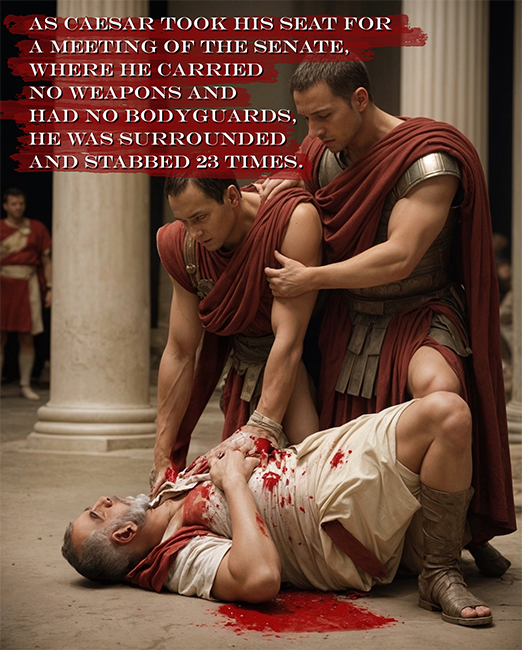
It was a common practice in Rome for men who lacked a male heir to adopt one, in their lifetime or in their will. Caesar had a son with Cleopatra, which he never officially acknowledged, but it was a great nephew, Octavian, who he left all his property to and named as his adopted son, upon his death. Though young and inexperienced, Octavian was able to use the position his uncle/father had given him and outflank his rivals. After years of maneuvering and further civil war, Octavian became the first emperor of the Roman Empire and took the name Augustus. It is notable that neither Augustus Caesar, nor his successors, claimed to be kings, even though they were. Why use the word, which the people still detested, when they could call themselves, “Caesars,” instead?
Augustus, and the leaders who followed him, maintained a republican facade — there was still a Senate and other familiar trappings of republicanism — but the man who held the title of “Caesar” held authority over all other power bases. Caesar was the law.
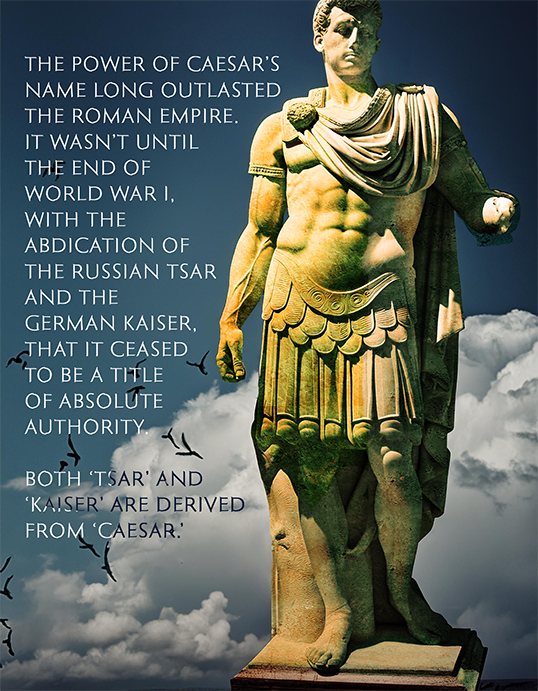
It can be difficult to judge historical figures fairly. They were prisoners of their times, who understood their world and their limitations from a point of view that we can dissect, but never fully relate to. How harshly should we judge Julius Caesar and Augusta Caesar for the part they played in turning Rome from a republic to an empire? Such questions are debatable. Was the crossing of the Rubicon really the end of the republic or had it been a dead man walking long before that? What we can say, because it’s a matter of observation rather than judgment, is that Julius and Augustus and the Caesars that followed are typically far more revered than the death of the republic has been lamented. This tells us something about humanity, about our general acceptance and, some would argue, our need to be ruled over, rather than ruling over ourselves. To this day, as we pass from July to August, from the month of Julius to the month of Augustus, even those of us who live in the greatest republic the world has ever known, continue to revere, or at least blindly accept, the greatness of the men who put a final end to the Roman Republic.
From Washington to Lincoln
The United States of America has been formed from many different influences and compared too many previous societies, but connections to Rome are certainly near the top of the list. The Founding Fathers were acutely aware of past failures in self-government, with the Roman Republic being the most notable. Could we form a republic made from the former subjects of a monarchy and make it work? Could we succeed where Rome failed? One thing that made people believe such a thing was possible, was the character of George Washington.
Washington was frequently compared to Cincinnatus and perhaps, with a man like that to set the standard for what would come, America could set an example that would change the world. Washington did, what no one had done in the past 2,000 years or so; he gave up great power and the opportunity to be dictator or king. This was true when he decided to leave the presidency after two terms, but it was most important when he gave up power after winning the Revolutionary War and allowed civilian, self-government, the opportunity to grow.
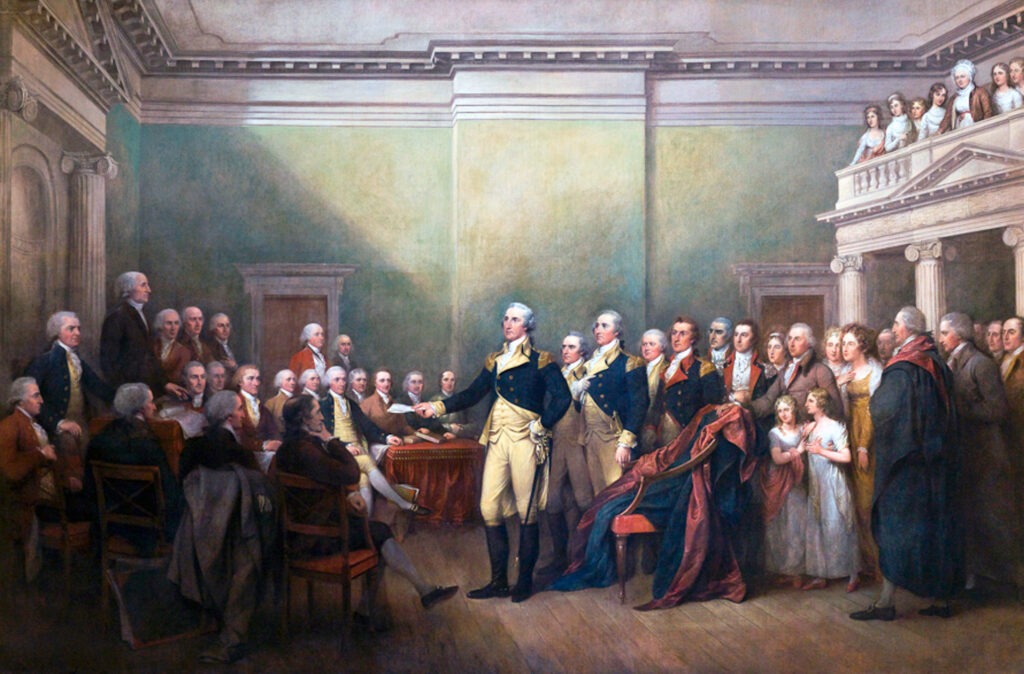
One of the huge paintings hanging in the Capital Rotunda is John Trumbull’s depiction of Washington resigning his commission. He is the key Founding Father, the rightly named, “Father of His Country,” for this act, more than any other. So great was the precedent that he set, that we have lived with little fear that anyone would refuse to give up power when their time came to do so, for nearly 250 years. Not until January 6, 2021 — when President Trump refused to accept his defeat at the ballot box and fomented a mob to storm past Trumbull’s painting and undue the vital tradition that Washington began — has it even seemed possible that Americans could so easily meet the end of our experiment in self government.
So cockeyed and selective is the MAGA view of our history, and the meaning of our republic, that Trump can now praise the “patriots” who stormed the Capital for him, seeking to murder his political enemies, and his rally crowds cheer him on. So bassackwards and everted is the misunderstanding of the rule of law in the Party of Trump, that he can condemn the just and lawful conviction of the, “Hang Mike Pence” thugs and label them the “Jan 6 Hostages,” without his supporters, or most of the news media, thinking it’s even important to mention it. “Isn’t that just, Trump being Trump?” But it’s not. It is a grave warning about how dramatically belief in the republic has crumbled.
This is how a republic dies, awash in meme logic, bumper sticker reasoning, and the misidentification of fellow citizens as enemies. The belief that we must, “Fight! Fight! Fight!” That violence is the answer.
During President Obama’s Administration, many of these same people who are now MAGA, and love to yell, “17-76!” as a justification for everything, including violent illegal behavior, used to call themselves, “Tea Party Patriots.” The choice of a name says so much; especially in this case. These people, who fall under the confusing umbrella of “conservatives” today, are not about conservation. They romanticize revolution and radical change in the name of bringing about the ideal society, as they see it. And they imagine that this is the same thing the Founding Fathers did. They also imagine that any minority of the people who feels it is necessary to commit acts of vandalism — as those who participated in the Boston Tea Party did, or something more violent — are inherently right to do so. Again, this is not conservative and it ignores far more of history than it selectively invokes.
In reality, the men who carried out the Boston Tea Party — most famously, John Adams’ cousin, Samuel Adams — were protesting the fact that lawmakers across a vast ocean could impose taxes on them, while they could do nothing to participate in the law making process. They were being ruled over by people they could not even communicate with in real time, with trips across the Atlantic taking weeks and no other form of communication available to them. Nothing like this exists today. More importantly, not everyone in the Founding Era agreed with even this mild act of lawlessness. John Adams and George Washington both saw this as the wrong way to express grievances, though they continued to back the patriot cause and work for it. These facts alone are vital to understanding how little the “patriots” of today, yelling, “17-76!” have in common with the patriots who broke this land away from a distant monarchy. There is no good reason to believe that even Samual Adams would support lawless acts of violence under a government he could help elect and easily communicate with. Nor is Samual at all significant to creating this republic and understanding its contours, as his cousin John and General Washington were. Yet it is to a distorted version of Samual that Tea Party/MAGA folk affix their sails while claiming to love the republic and Washington.
But we have far more evidence than this to see why the MAGA mutation of patriotism is not patriotic. Two substantive points are worth going into, in some detail. First, is the Whiskey Rebellion. Second, is Washington’s “Farewell Address.”
Whiskey Rebellion
The Whiskey Rebellion was an armed uprising against the authority of the national government and the Constitution that took place while President Washington was still in office. Led by James McFarlane, a Revolutionary War Veteran, with the participation of many other veterans, this conflict speaks volumes about what Washington would think of those using violence, or threatening violence, to solve today’s political questions.
These rebels, who refused to pay a new whiskey tax and had other grievances with their new government, saw this new rebellion in much the same way they saw the Revolutionary War. Washington disagreed. This turning point in American History is something that Tea Party/MAGA conservatives and libertarians tend to ignore because they want to see Washington as fighting against, “big government,” and not as a fighter for the preservation of the establishment.
One noteworthy exception to this viewpoint was L. Neil Smith, a libertarian science fiction writer who explored this topic in his first novel, The Probability Broach (1980). The story presents a scenario where a successful Whiskey Rebellion leads to the execution of George Washington and a rejection of the Constitution. This in turn led to a peaceful end to slavery, four decades before the Civil War would actually end it, an accelerated rate of scientific development, and the creation of a utopian paradise from Canada to Mexico by the 1890s. It is an imaginative tale that correctly places Washington in opposition to the thinking of the radical right today, but as an argument for how U.S. History could have played out better if it had a more radicalized beginning, it is unconvincing. Had the American Revolution been followed by a second uprising, which killed the lawfully elected leader of the nation and overturned the, “more perfect Union,” the people had created, political violence, not the rule of law would have become the norm. Similar to the French Revolution, it would have likely descended into a killing spree that devoured its children.
Farewell Address
During his final year in office, President Washington worked with Alexander Hamilton to write a letter, “To the PEOPLE of the UNITED STATES.” In it, Washington laid out his thoughts about the meaning of the republic and some advice for maintaining it. It was first published as, “The Address of Gen. Washington to the People of America on His Declining the Presidency of the United States,” in Claypoole’s American Daily Advertiser on September 19, 1796, before the election of his successor. No matter who won, Washington was stepping aside from power, once again. Today, the document is commonly known as Washington’s, “Farewell Address,” and, in my experience, is widely cited as a warning against, “foreign entanglements;” particularly by those who oppose foreign aid or military support, and want to back up their position by invoking our general admiration and reverence for Washington.
This is misleading. Washington’s arguments about how we should act towards other nations is more complex than these people present them — in fact, he never even uses the exact term “foreign entanglements” — and they tend to ignore the fact that Washington was writing from a very different perspective, born out of a very different time. America was very weak in comparison to many European powers more than two centuries ago, and we were separated by time because distances were so much harder to travel, etc. But we need not get into a deep analysis of how Washington’s views do or do not apply to foreign relations today, in this article. The issue here is how Washington understood the relationship of citizens to the state and the importance of the rule of law to maintaining our liberties. Nothing has fundamentally changed here and Washington’s thinking can be easily and directly applied to our era with no need for qualifying factors.
Washington directly explained why each of us should uphold the Constitution and work to preserve the Union. He also explains that this government
has a just claim to your confidence and your support. Respect for its authority, compliance with its laws, acquiescence in its measures, are duties enjoined by the fundamental maxims of true liberty. The basis of our political systems is the right of the people to make and to alter their constitutions of government. But the Constitution which at any time exists, till changed by an explicit and authentic act of the whole people, is sacredly obligatory upon all. The very idea of the power and the right of the people to establish government presupposes the duty of every individual to obey the established government.
Washington was a conservative, in the same sense that his contemporary in Great Britain, Edmund Burke, was a conservative; though they didn’t use the word to label themselves or expressly define this as a school of thought. Washington reluctantly joined the cause against his king after being convinced that Americans would never have their rights as Englishmen respected. They had to form their own country, where their rights would be respected. He had a duty-bound view of the individual’s relationship to government; not a hateful distrust of all things governmental or even an acceptance of government as a “necessary evil.” He was not a Robespierre, let alone a Lenin or a Mao, or any of he other names we commonly associate with the term, “revolutionary.” He was something far more practical than that, and this is a large part of why the American Revolution succeeded and all those other experiments failed.
The American Revolution was a conservative revolution. It was not seeking a dramatic recreation of society, only the rejection of inherited titles, a prescribed aristocracy, and colonial rule. The individual states already had elected representatives and other officials, as well as independent courts. With the Constitution, they brought all this together into one sustainable republic, with well thought out checks and balances. But, as Benjamin Franklin famously put it, it is only a republic, “if you can keep it.” The system cannot sustain itself without the understanding and support of the people. Washington well understood this. That is why he agreed to be the presiding officer at the Constitutional Convention, overseeing the writing of the Constitution. And that is why he agreed to serve as the first president under the Constitution, once it was ratified. He wanted to do all he could to ensure that the American Experiment succeeded. And that is why he put down the Whiskey Rebellion and implored all citizens to follow the law and use the legal process to make legal changes, rather than violence. He wasn’t perpetually stuck in 1776, nor did he ever understand that previous time, when the Declaration of Independence was written and ratified, to mean anything like what those yelling out, “17-76!” mean by it today.
Cooper Union Address
On February 27, 1860, Abraham Lincoln spoke at the Great Hall of Cooper Union‘s Foundation Building, in Manhattan, New York City. He was a long shot contender to be the Republican Party’s candidate for president that year and this has often been referred to as the speech that made Lincoln president. It certainly provided him with a great deal of free publicity as it was reprinted throughout the land. But it wasn’t simply the eloquence of his rhetoric that caught people’s attention, it was his forceful use of facts to make a well-reasoned argument that mattered most, and still matters.
Slavery was the issue that divided the national, “house,” as Lincoln put it, nearly two years earlier, and threatened to bring everything crashing down. One particular point of contention within the slavery debate was the question of its expansion. Lincoln had always maintained that the founders did not want to see slavery expand into new territories and, through a great deal of effort, he was able to find evidence that this was true for the vast majority of the founders. More important than this, however, was the legal question about if the Federal Government had the authority to regulate slavery in new Federal Territories, or if the inhabitants of a territory were the only ones who could decide this? The legal precedents were all in Lincoln’s favor, which he laid out in great detail. But many in the South wanted to ignore this reality and the Supreme Court was inclined to ignore the facts right along with them. If this view should win the day, not only would human beings be treated as cattle in a larger section of the United States, but the meaning and value of the Constitution would be undermined.
“Bearing this in mind,” Lincoln noted that the other side was trying to invoke President Washington’s warning about, “sectionalism,” and use it against Lincoln’s side. As if those who upheld the founder’s understanding of Federal Power were the ones causing the trouble here. Lincoln agreed that sectionalism was bad, but was Washington’s, “warning a weapon in [their] hands against us, or in our hands against [them]? Could Washington himself speak, would he cast the blame of that sectionalism upon us, who sustain his policy, or upon [those] who repudiate it?”
Here is where Lincoln brings up the word “conservative.” What does it mean and who should or should not use it? His explanation is, much like Washington’s ideas on sectionalism, often taken out of context and distorted, but here they are in full. Keep in mind that he is pretending to address those who have abandoned the facts in favor of their will.
But you say you are conservative – eminently conservative – while we are revolutionary, destructive, or something of the sort. What is conservatism? Is it not adherence to the old and tried, against the new and untried? We stick to, contend for, the identical old policy on the point in controversy which was adopted by “our fathers who framed the Government under which we live;” while you with one accord reject, and scout, and spit upon that old policy, and insist upon substituting something new. True, you disagree among yourselves as to what that substitute shall be. You are divided on new propositions and plans, but you are unanimous in rejecting and denouncing the old policy of the fathers. Some of you are for reviving the foreign slave trade; some for a Congressional Slave-Code for the Territories; some for Congress forbidding the Territories to prohibit Slavery within their limits; some for maintaining Slavery in the Territories through the judiciary; some for the “gur-reat pur-rinciple” that “if one man would enslave another, no third man should object,” fantastically called “Popular Sovereignty;” but never a man among you is in favor of federal prohibition of slavery in federal territories, according to the practice of “our fathers who framed the Government under which we live.” Not one of all your various plans can show a precedent or an advocate in the century within which our Government originated. Consider, then, whether your claim of conservatism for yourselves, and your charge or destructiveness against us, are based on the most clear and stable foundations.
It is important to note that Lincoln does not directly claim to be a conservative, as some would have you believe. Instead, he says that his side has a better claim on the word than the other side, who try to wrap themselves in it, while rejecting the past, rather than conserving it. Do you see the similarities with today? The MAGA crowd, along with the MAGA apologists on the Supreme Court, do not want to defend the Constitution, if it means that their man and their interests must give way. They want to ignore the rule of law, be it the Fourteenth Amendment’s prohibition against insurrectionists holding office, or a president being held to account in a court of law for their actions. Yet, they insist on labeling themselves as conservative. Wielding it like a hammer to corrupt any shared sense of meaning and further shatter the foundations of our republic.
When Lincoln went on to be the first Republican Party nominee for the Presidency, and then to be elected President, those who opposed him did not even give him time to take office. Instead, the majority of Slave States, and all those we think of as, “Southern States,” pretended they had the right to break up the Union, simply because they didn’t like who was duly elected president. This rejection of the rule of law was the logical end to the illogical path they had long followed. A path where, “patriotism,” means, “What’s good for me.” This path could have brought us back to the rule of men if Lincoln had not insisted on, “The Union Forever!”
Today, we are forced to confront a new breed of radicalism, masking as conservatism; a new return to the glorification of violence at the expense of the republic. What does this shift in norms mean for the future? Look to the Civil War. Look to the Whiskey Rebellion. Look to the fall of the Roman Republic. It’s not hard to see what a grave danger these things always prove to be. As President Lincoln famously said during the Civil War, “We shall nobly save, or meanly lose, the last best hope of earth.” The choice is ours. Of course, you can refuse to accept this reality, but that won’t make it go away. Others will simply make the choice for you.
What Lincoln faced during the Civil War is not exactly what we face today. The Confederacy was an illegally constituted political body that wished to conserve the blessing of White Supremacy upon themselves while forsaking everything else. What we face today — conserving the power of the presidency by denying power to everyone else — is a little different. To better understand this danger, we need to consider the words of a much younger Lincoln.
Speech to The Young Men’s Lyceum
Decades before the Civil War, Lincoln was already contemplating how republics are destroyed and what we should do to best protect the United States from ending up on the ash heap of history. In a speech to the Young Men’s Lyceum of Springfield, Illinois, on January 27, 1838, Lincoln warned that there will always be men who seek distinction and achievement. Those who came before him, the founders, could do this by daring to show the world, “a practical demonstration of the truth,” that, “a people [have the capability] to govern themselves,” but now, this experiment was, “understood to be a successful one.” Now, there would be a greater danger that ambitious men might seek to distinguish themselves in ways that could harm or fatally wound this experiment.
This field of glory is harvested, and the crop is already appropriated. But new reapers will arise, and they, too, will seek a field. It is to deny, what the history of the world tells us is true, to suppose that men of ambition and talents will not continue to spring up amongst us. And, when they do, they will as naturally seek the gratification of their ruling passion, as others have so done before them. The question then, is, can that gratification be found in supporting and maintaining an edifice that has been erected by others? Most certainly it cannot. Many great and good men sufficiently qualified for any task they should undertake, may ever be found, whose ambition would inspire to nothing beyond a seat in Congress, a gubernatorial or a presidential chair; but such belong not to the family of the lion, or the tribe of the eagle. What! think you these places would satisfy an Alexander, a Caesar, or a Napoleon?–Never! Towering genius distains a beaten path. It seeks regions hitherto unexplored.–It sees no distinction in adding story to story, upon the monuments of fame, erected to the memory of others. It denies that it is glory enough to serve under any chief. It scorns to tread in the footsteps of any predecessor, however illustrious. It thirsts and burns for distinction; and, if possible, it will have it, whether at the expense of emancipating slaves, or enslaving freemen. Is it unreasonable then to expect, that some man possessed of the loftiest genius, coupled with ambition sufficient to push it to its utmost stretch, will at some time, spring up among us? And when such a one does, it will require the people to be united with each other, attached to the government and laws, and generally intelligent, to successfully frustrate his designs.
We The People, in whose name the Constitution was written and ratified, hold the ultimate responsibility to ensure its success and reject would-be dictators, kings, emperors, or Caesars. It is up to us to maintain self government and the rule of law, which makes self government possible. He goes so far to say that, “reverence for the laws,” should not only be, “preached from the pulpit, proclaimed in legislative halls, and enforced in courts of justice,” it should, “become the political religion of the nation,” so that, “vain will be every effort, and fruitless every attempt, to subvert our national freedom.” It is not hard to envision how Lincoln would be denounced today, as a, “Deep State Agent, trying to push his brainwashing propaganda on us and make us all slaves of The State.” Such is the degree to which we have lost touch with the thinking necessary to make self government sustainable.
This particular danger took more than 150 years to come to fruition. Nevertheless, Lincoln’s warning and insights are still true. Some men see personal “distinction” as their, “paramount object.” They may be willing to, “acquire it by doing good [or] harm,” but if there is, “nothing left to be done in the way of building up, he would set boldly to the task of pulling down.”
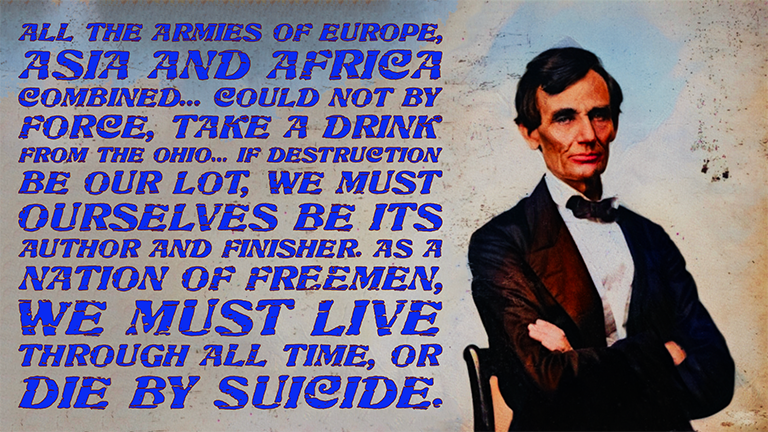
History Teaches, but only if you are willing to be a Student
How close are we to our Rubicon moment? Have we already passed it? Is the erosion of norms so great as to leave the rule of men as the only viable norm available to us? Had you asked me this before Trump made it to the White House, I would have laughed. Whatever our faults and problems, of which we had many, our imminent collapse was nowhere on my radar.
Donald Trump has ushered in an age where the personal ambitions of one man are now supported by such a vast amount of the people that the rule of law is under assault and threatened in ways that previous clownish figures, e.g. Joseph McCarthy and Huey P. Long, could hardly have imagined. But this is not to suggest that Trump is some great mastermind. Far from it. His clumsy and reckless efforts only exposed the weakness of what decades of wear and tear have made possible. We can debate the sequence and meaning of events that led us to a Trump Administration, but we must not delude ourselves into thinking that any of this is normal, or that norms are not important.
The transition from the Roman Republic to the Roman Empire demonstrates the dangers of allowing norms to erode without consequence. The actions of men like Marius, Sulla, and Caesar show that when leaders bypass or rewrite the rules for personal gain, and violence becomes an acceptable form of political discourse, it destroys the very foundations of the republic and the republic falls. By contrast, when men adhere to the rule of law and refuse to make their own glorification the purpose of society — men like Cincinnatus, Washington, and Lincoln — they become worthy of glorification. But, in the end, individual men will come and go. We cannot count on, or simply hope for good leaders, all the time. Ultimately, We The People need to decide if we will learn and apply the lessons of history, or if we will let it keep going the same way, over and over again.

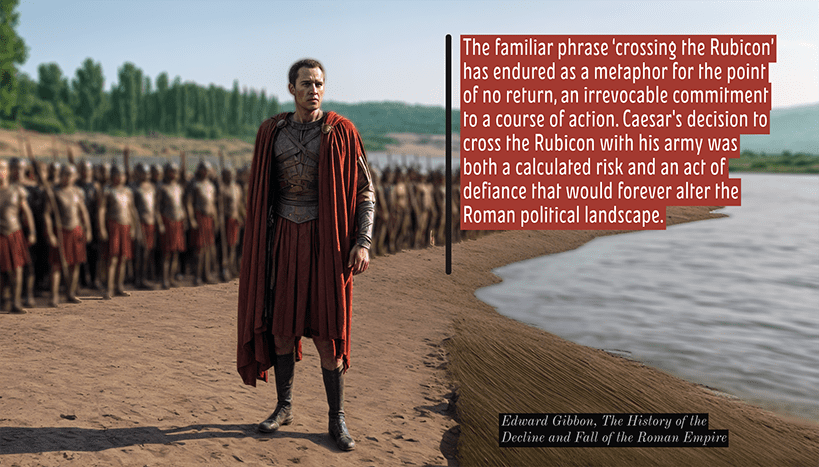



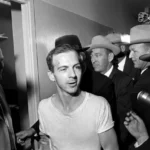
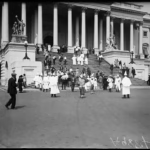



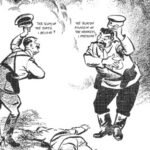


Leave a Reply